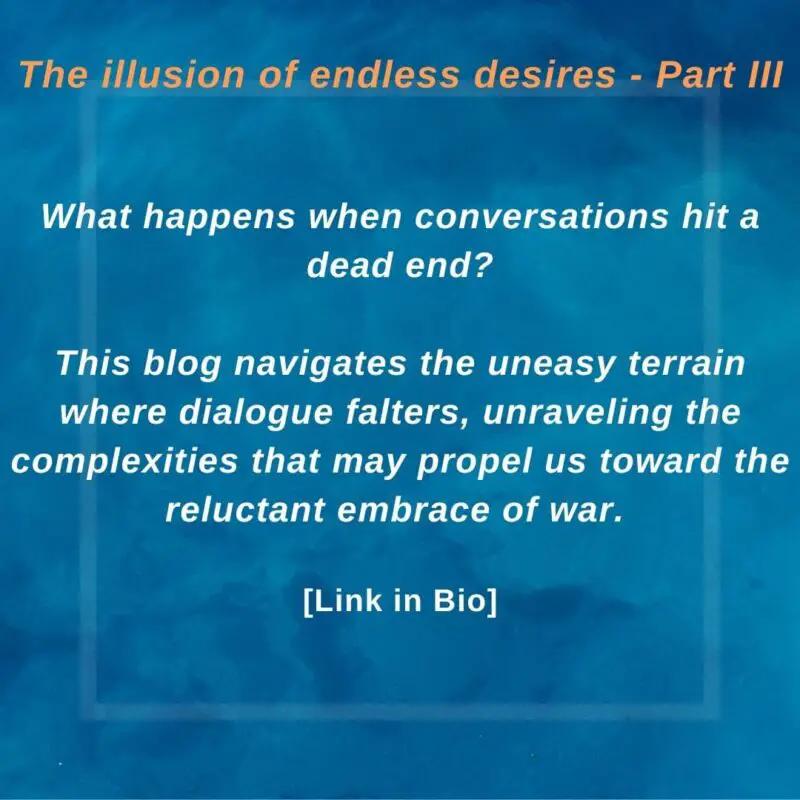Power and Greed: As we navigate the complex terrain of ownership and clash of interests, the question arises: what if conversations fail to bridge the divide? This blog delves into the agonizing dilemma when negotiation falls on deaf ears, exploring the nuanced dynamics that may lead to the unavoidable path of war. Drawing inspiration from historical narratives like Mahabharata, it seeks to unravel the complex interplay between conversation, negotiation, and the last resort of conflict.

Balancing Power and Greed: Making Tough Choices in Conflict
When we try to solve disagreements, sometimes things get really tough. This part of the article talks about those moments when talking just doesn’t work, and we’re faced with the possibility of fighting. We’ll look at stories from the past and think about the tricky situations where people have to decide whether to use force to get what they want. It’s all about understanding the struggle between wanting more for yourself and doing what’s right for everyone.
The Limits of Dialogue:
In the intricate dance of conflicting claims, there exists a threshold where dialogue falters to yield resolutions. Examining the constraints of conversation, we contemplate scenarios where interests are so entrenched that negotiation becomes an impractical avenue.
The Mahabharata Conundrum:
Reflecting on the timeless epic, Mahabharata, we draw parallels to situations where even divine intervention and persuasive diplomacy could not avert the inevitability of war. The saga becomes a poignant reminder that, at times, the pursuit of rightful ownership demands a resolute stand.
War as the Unwanted Solution:
In the face of unyielding opposition, the blog confronts the harsh reality that, despite the preference for peaceful resolutions, there are instances where war emerges as the only unwelcome solution. It explores the ethical and moral dimensions of resorting to conflict to safeguard one’s hard-earned rights.
The Price of Unyielding Resolve:
Examining historical and fictional narratives, we ponder the price paid for unyielding resolve. Does the pursuit of ownership at any cost come with consequences that echo through generations? Can war truly secure lasting victory, or does it perpetuate a cycle of strife?
The Moral Quandary:
As we navigate the moral quandary of choosing war over dialogue, the blog challenges readers to introspect on the limits of negotiation. It raises critical questions about the ethical considerations and the potential ramifications that accompany the decision to engage in conflict.
Further Reading: Exploring Selfishness and Self-Happiness
For a deeper exploration of the ethical considerations surrounding conflict and negotiation, delve into our related article:
Selfishness and Self-Happiness Explore the intricacies of selfishness and its impact on personal happiness in my thought-provoking article. Discover insights into the balance between individual desires and collective well-being, shedding light on the complexities of human nature.
Balancing Power and Greed in Pursuit of Harmony
In the tumultuous landscape where conversation may falter, the blog concludes by recognizing the complexity of the dilemma — the delicate balance between preserving one’s rights and the unintended consequences of conflict. It invites contemplation on whether, in certain circumstances, the resolute stance of war is an unfortunate but unavoidable solution in the pursuit of rightful ownership.”
Do Follow for More Tips and Inspiration:
- Instagram: Follow us on Instagram
- Pinterest: Follow our Pinterest profile
FAQs Related to “Power and Greed: Balancing Power and Greed in Pursuit of Harmony”
- How do negotiations sometimes fail to resolve conflicts, leading to the possibility of war?
- What historical narratives, like the Mahabharata, provide insights into the complexities of conflict resolution?
- Why might war be seen as an unwanted solution despite efforts to achieve peaceful resolutions?
- What are the long-term consequences of pursuing ownership through unyielding resolve, even if it leads to conflict?
- How do individuals grapple with the moral quandary of choosing war over dialogue in conflict situations?
- What ethical considerations should be taken into account when engaging in conflict for the sake of ownership?
- How does the pursuit of harmony factor into the balance between preserving one’s rights and avoiding conflict?
- Can conflict ever be justified as an unavoidable solution in the pursuit of rightful ownership? If so, under what circumstances?
- What lessons can be learned from exploring the theme of selfishness and its impact on conflict and negotiation?
- How can individuals navigate the complexities of power dynamics and greed while striving for harmony in relationships and society?
